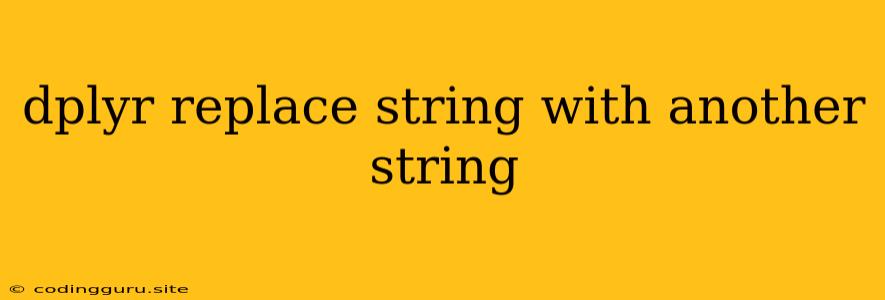How to Replace Strings with dplyr: A Comprehensive Guide
In data analysis, manipulating strings is a common task. You might need to clean messy data, standardize formats, or extract specific information. dplyr, a powerful package in R, provides efficient tools for working with data frames, including string manipulation. This guide will explore how to replace strings within your data using dplyr.
Understanding dplyr and String Manipulation
dplyr is a core package in the tidyverse ecosystem, known for its intuitive syntax and powerful data manipulation capabilities. It provides verbs like mutate, filter, and select for transforming and querying your data. For string manipulation, dplyr relies on the stringr package, which offers a wide range of functions for working with strings.
Replacing Strings with mutate and str_replace
Let's dive into the process of replacing strings using dplyr. The mutate verb is your go-to tool for creating new columns or modifying existing ones. Combined with str_replace from stringr, you can efficiently replace specific strings within your data.
Example:
Imagine you have a data frame called products containing a column named product_name. You want to replace all instances of "Apple" with "Apple Inc." in this column.
library(dplyr)
library(stringr)
products <- data.frame(
product_name = c("Apple iPhone 14", "Samsung Galaxy S23", "Apple Watch Series 8")
)
products <- products %>%
mutate(product_name = str_replace(product_name, "Apple", "Apple Inc."))
print(products)
Explanation:
mutate(product_name = ...)creates a new column namedproduct_nameor modifies the existing one.str_replace(product_name, "Apple", "Apple Inc.")searches for "Apple" in theproduct_namecolumn and replaces it with "Apple Inc.".
Advanced String Replacement Techniques
dplyr and stringr provide versatile options for string manipulation beyond simple replacements:
1. Replacing Multiple Occurrences:
Use str_replace_all to replace all occurrences of a string within a column:
products <- products %>%
mutate(product_name = str_replace_all(product_name, "Apple", "Apple Inc."))
2. Replacing with Regular Expressions:
Regular expressions (regex) are powerful tools for pattern matching. Use str_replace or str_replace_all in conjunction with regex to match complex patterns:
products <- products %>%
mutate(product_name = str_replace_all(product_name, "Series [0-9]+", "Series"))
This example replaces any string like "Series 8" with "Series" using the regex Series [0-9]+, where [0-9]+ matches any number.
3. Replacing based on Conditions:
Use ifelse within mutate to replace strings based on specific conditions:
products <- products %>%
mutate(product_name = ifelse(product_name == "Apple iPhone 14", "Apple iPhone 14 Pro", product_name))
This example replaces only "Apple iPhone 14" with "Apple iPhone 14 Pro" while leaving other values unchanged.
4. Replacing with a Function:
Define a function to perform more complex string replacements. This allows you to encapsulate reusable logic.
replace_brand <- function(name) {
if (grepl("Apple", name)) {
return(str_replace(name, "Apple", "Apple Inc."))
} else {
return(name)
}
}
products <- products %>%
mutate(product_name = replace_brand(product_name))
Conclusion
dplyr and stringr offer a powerful combination for efficiently replacing strings within your data frames. This guide has explored basic and advanced techniques, enabling you to clean, standardize, and extract information from your data with confidence. Mastering these methods will significantly enhance your data manipulation skills in R.
